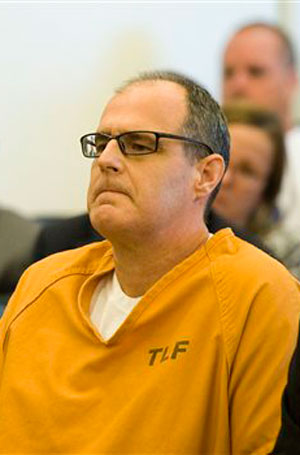In 'blistering' ruling, court upholds recusal of entire Orange County DA's office from murder case

Scott Dekraai. AP Photo.
A California appeals court issued a sharply worded rebuke to the state Attorney General’s office yesterday in a high-profile case, the Orange County Register reported.
The ruling came in the high-profile murder trial of Scott Dekraai, who in 2011 shot up the hair salon where his former wife was working, killing eight people and injuring one. His public defender, Scott Sanders, uncovered evidence that sheriff’s deputies were using jailhouse informants to solicit incriminating statements from high-profile defendants, and that prosecutors failed to disclose the practice. If true, both would violate defendants’ civil rights. After six months of evidentiary hearings, trial judge Thomas Goethals recused all the prosecutors in Orange County and gave the case to the state Attorney General’s office, which appealed the order.
In its ruling Tuesday upholding the trial judge’s decision in People v. Dekraai (PDF), California’s Fourth District Court of Appeal, Division Three, chastised the AG’s office for the appeal, using italic script to call part of its arguments “nonsense.”
“The court recused the OCDA only after lengthy evidentiary hearings where it heard a steady stream of evidence regarding improper conduct by the prosecution team,” wrote Presiding Justice Kathleen O’Leary, joined by Justices Richard Fybel and Raymond Ikola. “To suggest the trial judge prejudged the case is reckless and grossly unfair. These proceedings were a search for the truth.”
Also on Tuesday, the Register reported that a previously undisclosed grand jury has been investigating the way the DA’s office and Sheriff’s Department use jailhouse informants. Orange County supervisors disclosed the existence of the grand jury Tuesday when they authorized more funding for the effort and released related documents. The chief of staff for the DA’s office said the office welcomed the investigation and had cooperated; a spokesman for the sheriff’s department said it had not been aware of the probe but would cooperate.
During discovery in Dekraai’s case, Sanders realized that the same jailhouse informant, supposedly a volunteer who expected nothing in return, was also informing on another high-profile client, Daniel Wozniak. Sanders began looking into the use of informants in Orange County and discovered evidence showing that illegal use of jailhouse informants may go back decades in Orange County. This would have been despite the U.S. Supreme Court’s 1964 ruling in Massiah v. United States, which expressly forbids the practice. Prosecutors had not turned over any of it in discovery and indeed resisted related discovery requests, Sanders said, which would violate their obligations under 1963’s Brady v. Maryland.
The accusations have had a ripple effect in Orange County, where multiple criminal cases that may have involved jailhouse informants have gotten new trials, new sentences or sweetheart plea deals. Defense lawyers told the ABA Journal last year that they believe this is intended to avoid discovery in the cases. At least two sheriff’s deputies have taken the Fifth Amendment in such cases. No deputies or prosecutors have been disciplined, although one prosecutor voluntarily resigned and moved to Nebraska.
The situation has created discord in the county’s relatively small legal community. Criminal defense lawyers told the ABA Journal that some prosecutors had been personally unkind to Sanders and others viewed as sympathetic to him. One defense lawyer, James Crawford, told the media he was beaten by an investigator for the DA’s office in a courtroom; his civil attorney told the ABA Journal he believes it was revenge for Crawford’s work on an informant-related case.
And prosecutors have filed an unusually high number of motions to recuse Goethals from murder cases. The DA’s office denies that this was an orchestrated campaign, but the Fourth District Court of Appeal disagreed, My News LA reported. Though the office was within its rights under California caselaw, O’Leary wrote in July, it engaged in “blanket papering” of the judge.



